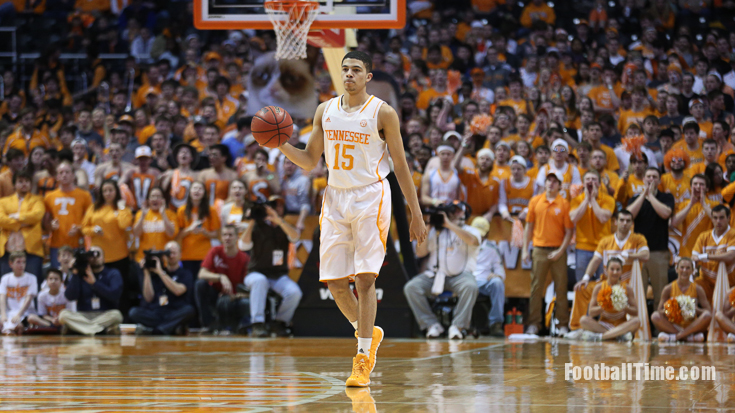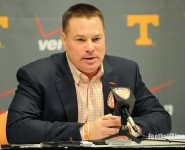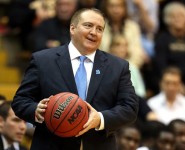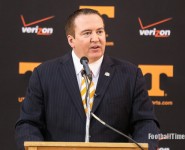Opinion: Fixing Tennessee basketball

This isn’t a “Bring Back Bruce” or a “Keep/Fire Cuonzo” piece. If you want to read on those topics, I’ve chronicled my thoughts on both coaches here and agree with much of what my colleague Dave Hooker wrote here.
No. This post is about fixing Tennessee basketball no matter who’s coaching. Here are three places to start.
1. The Vols need more shooters
Basketball is, after all, ultimately about putting the ball in the bucket. The last pure shooter to play for Tennessee was Chris Lofton. He ranked in the top-10 in the SEC in 3-point percentage every year he played and many consider him as the best shooter in college basketball history.
In the last 10 years, only one Vol (not named Lofton) ranked in the top-10 in the SEC in 3-point percentage for a season—C.J. Watson in 2005-06. JaJuan Smith nearly cracked the top-10 in 3-point percentage one year. Lofton, Watson, and Smith all signed with Tennessee at least 10 years ago.
Since then, the Vols have failed to sign one pure shooter (no disrespect to Skylar McBee, a solid but not elite shooter) who panned out at the college level. Pearl’s first three Vol teams won 76% of their games and averaged a top-5 conference ranking in 3-point percentage. Once Lofton, Watson, and Smith were gone, his teams struggled beyond the arc. From 2008-2011, Pearl’s teams ranked no better than second to last in the SEC in 3-point percentage. Those teams still won 65% of their games (Martin’s Vol teams, comparatively, have won 59% of their games), but the drop off in wins and 3-point shooting is significant.
The Vols currently rank 7th in the SEC in 3-point percentage and we all saw them go an inexcusable 1-19 beyond the arc at Florida. They certainly aren’t a prolific, or even consistent, threat from deep.
Tennessee needs more shooters. In fact, they need several of them. And they’ve needed to find them and sign them for a decade and haven’t. No matter who the coach is moving forward, adding a handful of consistent shooters would certainly improve the product on the court and ultimately increase the number in the win column. Can you imagine how much more dominant Jarnell Stokes would be if the Vols had several players around him who could stretch opposing defenses?
2. The Vols need a rim protector
If you’ve watched Tennessee at all this year, you’ve seen teams repeatedly expose UT’s lack of shot blockers. When opponents get in the paint, they usually finish with little resistance. Tennessee’s lack of rim protectors isn’t a recent development.
The last 13 seasons, the Vols ranked in the top-third of the SEC in blocks just once—in 2001-2002 when Tennessee ranked 4th in the SEC. That season, Marcus Haislip (remember him?) averaged 1.76 blocks per game which ranked 2nd in the SEC. Tennessee’s only elite shot blocker this millennium played over 10 years ago.
In the last decade, the Vols have had a player finish in the top-10 in the SEC in blocks exactly twice. Wayne Chism accomplished that feat in 07-08 and 09-10—years the Vols got to the Sweet Sixteen and Elite Eight. For comparison, Kentucky had AT LEAST one player rank in the top-10 in the conference in blocks 12 of the last 13 seasons.
You don’t have to feature a string of athletic rim protectors to win games, but having at least one certainly helps.
3. The Vols need true floor generals
They’re not easy to find, but the Vols must start signing true floor generals. C.J. Watson was the last Vol point guard to earn All-SEC honors. A four-year starter, Watson is now a successful backup point guard for the Indiana Pacers. Since his graduation, the Vol point guard position has largely been plagued by inconsistency.
In the eight years since Watson donned the orange and white, it’s safe to say the Vols have had above average point guard play twice. Tennessee’s starting point guard ranked in the top-10 in the SEC in assist-to-turnover ratio three times since Watson. Bobby Maze finished 3rd in the SEC in assist-to-turnover ratio his two seasons on Rocky Top even though he was more of a combo guard than a true point. His play was key in leading the Vols to the Elite Eight in 2009-10. Other than Maze, UT’s point guards have been maddeningly inconsistent.
In 2007-08, Jordan Howell became the only other starting Vol PG to rank in the top-10 in conference assist-to-turnover ratio—but most of those came against UT’s non-conference opponents. He was benched halfway through the season in favor of the more capable scorer, Ramar Smith. He proved to be inconsistent as well and was benched in the NCAA Tournament when Pearl made the risky, but correct, move to start J.P. Prince at point guard.
Trae Golden ran the show Martin’s first two years in Knoxville and was the best scorer the Vols started at point guard since Watson. But Tennessee lived and died with Golden each of the last two seasons and when he didn’t show up, it was extremely difficult for the Vols to win. When Golden scored 12 or more last season the Vols were 12-0. When he scored in double-figures Tennessee was 15-3. When he failed to reach double figures UT was 5-7. The Vols won 9 of their last 11 games last year but in their two losses Golden was a combined 2-17 from the floor. That’s inconsistency.
This season, both Barton and Thompson has been effective at times, but they’ve been anything but consistent. Barton is more appropriately suited to play shooting guard while Thompson is perhaps Tennessee’s first true point guard since Watson. Thompson’s assist-to-turnover ratio currently ranks 3rd in the SEC, but he has struggled to balance scoring with offensive production. He has the tools to develop into a consistent and effective floor general, but he’s not there yet.
When looking at the last 13 years of Vol hoops, Tennessee won at the highest rate when they had good shooters, a rim protector, and above average point guard play, but the players who most adeptly filled those roles all signed over 10 years ago. If history is any indicator, and no matter who’s leading the Vols in the future, bringing in players who can fill those roles well will be paramount to returning Tennessee to a perennial top-25 team.
*All stats from ESPN.com.




